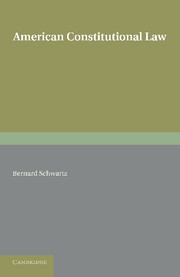Book contents
- Frontmatter
- Dedication
- Contents
- Foreword
- Preface
- PART I THE STRUCTURE
- PART II MODERN DEVELOPMENTS
- Chapter VI The New Federalism
- Chapter VII Presidential Prerogative and the Steel Seizure Case
- Chapter VIII The Changing Role of the Supreme Court
- Chapter IX The Negro and the Law
- Chapter X Civil Liberties and the 'Cold War
- Chapter XI Administrative Law
- Chapter XII The United States and the United Nations
- Appendix: Constitution of the United States of America
- Index of Cases
- General Index
Chapter IX - The Negro and the Law
from PART II - MODERN DEVELOPMENTS
Published online by Cambridge University Press: 05 June 2016
- Frontmatter
- Dedication
- Contents
- Foreword
- Preface
- PART I THE STRUCTURE
- PART II MODERN DEVELOPMENTS
- Chapter VI The New Federalism
- Chapter VII Presidential Prerogative and the Steel Seizure Case
- Chapter VIII The Changing Role of the Supreme Court
- Chapter IX The Negro and the Law
- Chapter X Civil Liberties and the 'Cold War
- Chapter XI Administrative Law
- Chapter XII The United States and the United Nations
- Appendix: Constitution of the United States of America
- Index of Cases
- General Index
Summary
An American travelling outside the United States cannot help but be struck by the vast interest displayed in the position of the Negro in his country. The reason for that interest is not hard to find. ‘Our American heritage of freedom and equality has given us prestige among the nations of the world, and a strong feeling of national pride at home. There is much reason for that pride. But pride is no substitute for steady and honest performance, and the record shows that at varying times in American history the gulf between ideals and practice has been wide.’ To the foreigner, the position of the Negro in the United States indicates that the American ideal of freedom and equality for all men is still far from complete realization.
For this gap between ideal and reality, American law must take a portion of the blame. It is true that discrimination against the Negro in the United States has roots deeper than the actions of legislatures and courts. Historical causes reaching far back into North American origins have placed the Negro race in the position of ‘second-class’ citizens. ‘The Civil War gave the Negro legal equality with his former masters, but it could not and did not give him either the experience in the exercise of freedom or the moral status in the sight of his white fellow citizens to make the freedom of the Negro an acceptable and workable relationship for them.’ Discrimination against the Negro is still embedded in the customs of a large part of the United States.
It is, however, inevitable that the law should play a pivotal role in a country whose political and legal institutions are British in origin. This is especially true under the American constitutional system, where the work of the courts is of such significance. Discrimination against the Negro could not have as great an effect without the condonation of the legal order. The consent of the courts has been necessary for the subordinate status of the Negro to become of more than extra-legal consequence.
That the American courts have condoned, if not encouraged, discriminatory practices should not be a source of surprise.
- Type
- Chapter
- Information
- American Constitutional Law , pp. 222 - 239Publisher: Cambridge University PressPrint publication year: 2013



